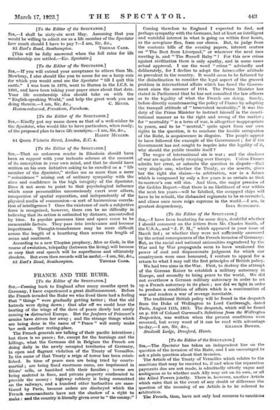FRANCE AND THE RUHR.
[To the Editor of the SPECTATOR.]
Sur,—Coming back to England after many months spent in Germany, I have experienced a great disillusionment. Before the French invaded the Ruhr we who lived there had a feeling that " things " were gradually getting better ; that the old hatreds were dying down ; that afar off we could hear the beating of the wings of the dove of peace slowly but surely coming to distracted Europe. But the fanfares of Poineare's armies have driven her away ; and the strange things which are being done in the name of " Peace " will surely make her seek another resting-place.
The French generals are talking of their pacific intentions ; but there is no peace ; for, except for the burnings and the killings, what the Germans did in Belgium the French are doing daily in the newly occupied territories of Germany, in open and flagrant violation of the Treaty of Versailles. In the name of that Treaty a reign of terror has been estab- lished. In time of peace men are being tried by courts- martial ; are being fined enormous sums, are imprisoned in felons' cells, or _banished with their families ; towns are being mulcted in fines, and private property confiscated to provide the money : highway robbery is being committed on the railways, and a hundred other barbarities are sanc- tioned by Paris, because orders are disobeyed which the French commandants have not the shadow of a right to make : and the country is literally given over to " the enemy." Coming therefore to England I expected to find, not perhaps sympathy with the Germans, but at least an intelligent and watchful interest in what is going on within four hours, as the aeroplane flies, from our shores. But, to judge from the contents bills of the evening papers, interest centres on " The Best from Liverpool," or wherever the next race meeting is, and " The Russell Baby " 1 For this new crime against civilization there is only apathy, and in some cases actual approval. I use the word " crime " advisedly and deliberately, for I decline to adopt the laissez-aller attitude so prevalent in the country. It would seem to be fathered by the disinclination to consider the legal aspect of the gravest problem in international affairs which has faced the Govern- ment since the summer of 1914. The Prime Minister has stated in Parliament that he has not consulted the law officers as to the legality of what the French are doing. Surely, before directly countenancing the policy of France by adopting the tranquil attitude of " benevolent neutrality," it was the duty of the Prime Minister to instruct himself in the consti- tutional manner as to the right and wrong of the matter ; for " neutrality " is a term of war, is altogether inappropriate to peace, and to be " neutral," quite apart from our own rights in the question, is to condone the hostile occupation of the Ruhr, is acquiescence in disguise. The people appear to have followed the example of the Government ; for if the Government has not sought to inquire into the legality of it, why should the public trouble itself ?
The wages of international sin is war ; and the shadows of war are again slowly creeping over Europe. Unless France admits her error, or submits the question in dispute—that very simple one, whether the Treaty, as she asserts, gives her the right she claims—to arbitration, war in a future which is compassed by only a few years is as certain as that to-morrow's sun will rise. And then, the major premise of the Geddes Report—that there is no likelihood of war within the next ten years—will be falsified, the scrapped ships will have to be rebuilt, the disbanded regiments to be re-recruited, and chaos once more reign supreme in the world.—I am, iu










































 Previous page
Previous page